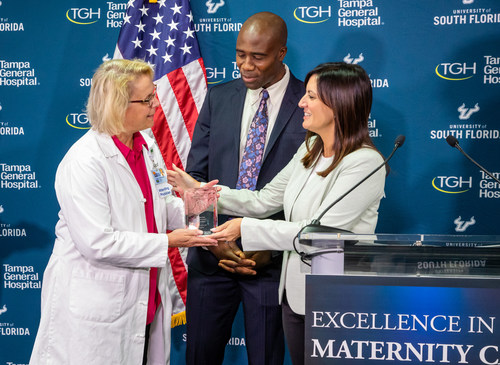Tampa General Hospital Is Recognized for Reducing Unnecessary Cesarean Section Deliveries in First-Time Mothers
Lt. Governor Jeanette Nuñez honors Tampa General with award for its commitment to providing the safest care to mothers and their babies in the Tampa Bay region and for exceeding national goals.
Tampa General Hospital has been recognized for exceeding national goals for reducing the number of unnecessary cesarean deliveries for first-time mothers with low-risk pregnancies and instead promoting vaginal deliveries.
Tampa General is one of just 26 delivery hospitals in Florida to achieve the distinction in 2022.

Florida has one of the highest cesarean section (C-section) rates in the U.S., leading to state and national efforts to promote safe vaginal deliveries. Tampa General achieved a C-section rate of 21.4 percent – exceeding the goal of 23.6 percent set by Healthy People 2030, a U.S. Department of Health and Human Services women’s and children’s health initiative. The current national cesarean delivery rate is 32 percent. The initiative is focused on preventing pregnancy complications and maternal deaths and helping women stay healthy before, during and after their pregnancies.
Lt. Governor Jeanette Nuñez visited Tampa General today to present the hospital with an award for its continuing efforts to reduce unnecessary C-section deliveries and promote safe vaginal deliveries. She was joined by Dr. Joseph Ladapo, Florida’s Surgeon General, and officials from the state Agency for Health Care Administration and the Florida Department of Health.
“Exceeding national goals for reducing unnecessary C-sections for two straight years is a tremendous recognition for all of those working with the Women and Children’s Institute at Tampa General,” said John Couris, president and CEO of Tampa General Hospital. “We are honored to receive this award from Lt. Governor Nuñez and Surgeon General Ladapo as we continue on our journey to provide the safest and highest quality care in the country to mothers and their babies.”
In all, only 26 of 114 hospitals in Florida – or 29 percent of those participating – exceeded the national goals and are being recognized by the state.
“We are honored to see our primary hospital partner receive this recognition from the state,” said Dr. Charles J. Lockwood, executive vice president of USF Health, dean of the USF Health Morsani College of Medicine, and a maternal-fetal medicine expert. “Obstetrician-gynecologists across the state are working together to safeguard women’s and children’s health by preventing unnecessary surgeries that carry increased risk.”
Cesarean deliveries can prevent injury and death in women who are at higher risk of having complicated deliveries or unexpected complications, including prevention of injury and death in their newborns. But C-sections are also linked to an increased risk of severe bleeding, infections, blood clots, and complications in future pregnancies. Some women who aren’t at higher risk for delivery complications may have unnecessary C-sections that lengthen their recovery times. That has prompted efforts at hospitals and by medical providers to help reduce the number of C-sections performed on low-risk mothers.
“The success in reducing the number of unnecessary C-sections is the result of ongoing close teamwork between Tampa General, OB/GYN physicians, and midwives who deliver patients at the hospital,” said Dr. Karen Bruder, associate professor and director of the Division of Specialists in General OB/GYN, Department of Obstetrics and Gynecology in the USF Health Morsani College of Medicine and medical director of OB/GYN, Genesis Health at Tampa General. She also credited the ongoing work of the Florida Perinatal Quality Collaborative at the USF College of Public Health, which has initiatives that focus on providing evidence-based perinatal care, education and training.
“Collaboration among our partners and our relentless emphasis on following best practices leads to better health care for women and children as reducing C-section rates for first time mothers impacts their health and safety throughout their lifetime,” Bruder said. “I am delighted for the entire team who share in this award, but even more so for the impact we’re having on providing the safest care to mothers and their babies in the Tampa Bay region.”
Tampa General delivers more babies than any other hospital in Tampa Bay, with about 6,500 births at the hospital since Oct. 1, 2021, noted Dr. Judette Louis, James M. Ingram Professor and Chair, Department of Obstetrics and Gynecology, USF Health Morsani College of Medicine and medical director of the Women’s Institute at Tampa General Hospital. “Our success in preventing unnecessary C-sections in low-risk women once again underscores our commitment to the safety of our patients and sends a message to expectant mothers that where you choose to receive your prenatal care and deliver your baby really does matter.”
Along with this latest recognition, Tampa General Hospital has been ranked #1 in Florida and Top 50 in the nation in Obstetrics and Gynecology by U.S. News & World Report’s 2022-23 Best Hospitals, named a Best Maternity Hospital in 2022 by Newsweek, and was one of only 15 hospitals in Florida recognized in 2021 for exceeding the national Healthy People 2030 goals for reducing unnecessary C-sections, and was also named a Best Maternity Hospital by Newsweek and the Leapfrog Group in 2020.
Tampa General Hospital, a 1,040-bed, not-for-profit, academic medical center, is one of the largest hospitals in America and delivers world-class care as the region’s only center for Level l trauma and comprehensive burn care. Tampa General Hospital is the highest-ranked hospital in the market in U.S. News & World Report’s 2022-23 Best Hospitals, and is tied as the third highest-ranked hospital in Florida, with seven specialties ranking among the best programs in the United States. Tampa General Hospital has been designated as a model of excellence by the 2022 Fortune/Merative 100 Top Hospitals list. The academic medical center’s commitment to growing and developing its team members is recognized by two prestigious Forbes magazine rankings – first nationally in the 2022 America’s Best Employers for Women and sixth out of 100 Florida companies in the 2022 America’s Best Employers by State. Tampa General is the safety net hospital for the region, caring for everyone regardless of their ability to pay, and in fiscal year 2020, provided a net community benefit worth more than $182.5 million in the form of health care for underinsured patients, community education, and financial support to community health organizations in Tampa Bay. It is one of the nation’s busiest adult solid organ transplant centers and is the primary teaching hospital for the USF Health Morsani College of Medicine. With six medical helicopters, Tampa General Hospital transports critically injured or ill patients from 23 surrounding counties to receive the advanced care they need. Tampa General houses a nationally accredited comprehensive stroke center, and its 32-bed Neuroscience, Intensive Care Unit is the largest on the West Coast of Florida. It also is home to the Jennifer Leigh Muma 82-bed Level IV neonatal intensive care unit, and a nationally accredited rehabilitation center. Tampa General Hospital’s footprint includes 17 Tampa General Medical Group Primary Care offices, TGH Family Care Center Kennedy, TGH Brandon Healthplex, TGH Virtual Health, and 21 TGH Imaging powered by Tower outpatient radiology centers throughout Hillsborough, Pasco, Pinellas and Palm Beach counties. Tampa Bay area residents also receive world-class care from the TGH Urgent Care powered by Fast Track network of clinics, and they can even receive home visits in select areas through TGH Urgent Care at Home, powered by Fast Track. As one of the largest hospitals in the country, Tampa General Hospital is the first in Florida to partner with GE Healthcare and open a clinical command center that provides real-time situational awareness to improve and better coordinate patient care at a lower cost. For more information, go to https://www.tgh.org.










